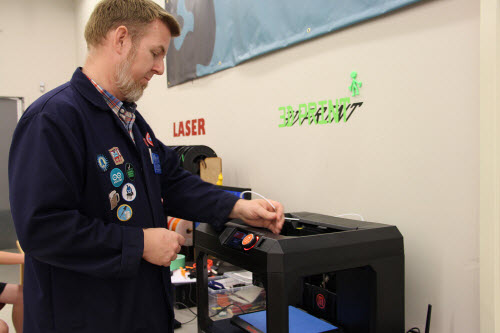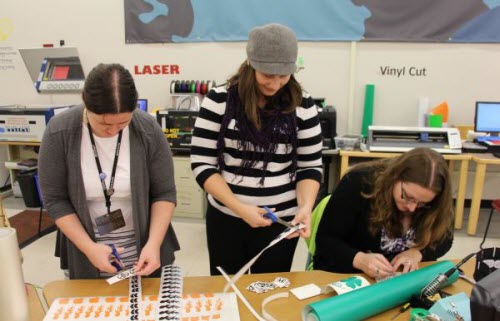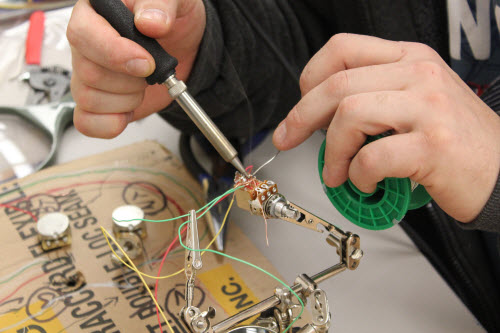Cultivating a Hacker Ethic: Digital Citizenship at Innisfil Public Library
Special thanks to Debra Mann, Reference Librarian at Innisfil Public Library (Ontario), for taking the time to share this story with us in response to our article on Digital Citizenship.
 At Innisfil Public Library, our vision is to spark ideas to ignite a creative and dynamic community. A central pillar of our current strategic plan is to "Cultivate a Hacker Ethic" through integrating technology into our services and spaces, and building technological confidence. As a result, the concept of responsible digital citizenship weaves quite naturally into many of our programs and services, even if it is not explicitly stated.
At Innisfil Public Library, our vision is to spark ideas to ignite a creative and dynamic community. A central pillar of our current strategic plan is to "Cultivate a Hacker Ethic" through integrating technology into our services and spaces, and building technological confidence. As a result, the concept of responsible digital citizenship weaves quite naturally into many of our programs and services, even if it is not explicitly stated.
The Library has long offered traditional technology classes, usually done in a training room with participants at individual computer stations. Many of these classes tackle specific examples of digital citizenship. Our Email 101 course discusses email etiquette; courses on social media tools like Facebook, Twitter, and Pinterest deal with the ins and outs of managing your social media presence. These traditional technology courses convey the idea that you can harness technology to work for you, rather than the other way around.
Some courses, however, take an entirely unique approach. Hiding Your Digital Footprint, aimed at an adult crowd and offered by a member of our IT Department, discusses the various degrees to which citizens can protect their privacy online. We have offered the class as a standalone and as a book club paired with Little Brother by Cory Doctorow.
 Even a program as casual as Appy Hour, a technology social club for seniors that meets weekly to discuss one new thing about technology, can convey the ideas of responsible digital citizenship. Recent sessions have touched on trolling behaviors and how to combat them, the strategic use of humour on Twitter, and critically evaluating online medical information.
Even a program as casual as Appy Hour, a technology social club for seniors that meets weekly to discuss one new thing about technology, can convey the ideas of responsible digital citizenship. Recent sessions have touched on trolling behaviors and how to combat them, the strategic use of humour on Twitter, and critically evaluating online medical information.
Appy Hour is a free drop-in program that runs in the Library's public space. Participants are encouraged to drop topic suggestions into a basket and these are addressed in subsequent weeks. Sometimes topics of discussion are drawn from current events; the Heartbleed bug prompted a discussion of password safety, and a nearby tornado informed a discussion on weather and emergency preparedness information online. The first half hour of the program is dedicated to the topic of the week, while the last half hour is reserved for questions and socializing. The program takes minimal staff time but offers a quality experience for our users.
By visiting our Hacker Space or using the Digital Media Lab to work on creative projects, our community members are introduced to technological innovations in a way that is spontaneous, engaging and non-threatening. These interactions invoke richer conversations about creativity and lead into more rigorous use of our spaces, services, and equipment. Our connections with local makers/hackers often involve discussions of copyright, fair use, Creative Commons, etc.
Our opportunity for growth and development as an organization lie in points 7 and 8 of the description of Digital Citizenship: recognizing teaching tools to help the wide range of technology users, and identifying teaching methodologies to reach the digital literacy needs of the community. Classes like Appy Hour, and programs or activities within the hacker Space or Digital Media Lab certainly attempt to approach the issue in a less formal, more informational way. These in turn feed more structured learning opportunities like technology classes and bookings in the Hacker Space and Digital Media Lab.

With any type of tech training, we have found that the key to success lies in positioning ourselves as co-learners. Library professionals are fantastic at finding information, and we can use that skill to help our community members solve their tech questions. We don't have to – and can't possibly - know everything, but we can demonstrate our strategies for uncovering the right answers. This extends equally to engaged, responsible, digital citizenship.
Join the October 14 webinar to learn more about digital citizenship in public libraries: Digital Citizenship: New Roles and Responsibilities in the Digital Age
